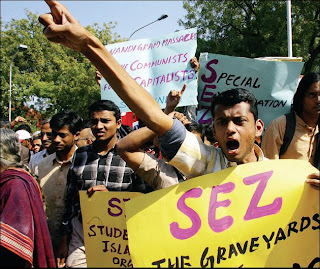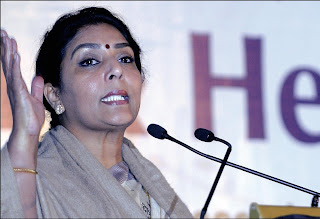Genocide and many rendered landless – that defines SEZs in West Bengal! “If you do an honest economic analysis of land classified as an SEZ vis-á-vis land used for agriculture, SEZs certainly give better returns and opportunities. But using social indicators and politics of the day, it is difficult to say what will be the outcome. However, if the SEZs are granted to private parties, then everything should be done on commercial basis...” explains Mohammed Saqib, Senior Fellow, Rajiv Gandhi Foundation.
Foundation.
However, this sequestered unrest has not deterred the Board of Approval (BoA), as it recently awarded conditional approval to Mukesh Ambani-promoted Navi Mumbai SEZ and 20 others. Thus, the total number of approved SEZs in the country stands at 360. The BoA also, of late, gave its approval to Hindalco in Orissa, the first North-East SEZ in Nagaland and to Parsvnath in Haryana. “All the states are competing to get SEZs in their place. Each wants to leave the other one behind,” comments Amir Ullah Khan, Senior Fellow, Indian Development Foundation.
The government has revealed that from 2006-07 to 2009-10, it has accrued loss of revenues of around Rs.1.03 trillion due to fiscal sops to SEZs. The government is believed to be thinking along the OECD lines, that suggests removal of sops. The other biggest challenge is the social acceptability and justification of SEZs, while keeping politics out of it. Would these measures turn SEZs into profitable zones for the government? The answer is startling as Saqib points out, “If the government stays out, all the SEZs in India will become profitable. The government should only work as a watch dog...”
 Foundation.
Foundation.However, this sequestered unrest has not deterred the Board of Approval (BoA), as it recently awarded conditional approval to Mukesh Ambani-promoted Navi Mumbai SEZ and 20 others. Thus, the total number of approved SEZs in the country stands at 360. The BoA also, of late, gave its approval to Hindalco in Orissa, the first North-East SEZ in Nagaland and to Parsvnath in Haryana. “All the states are competing to get SEZs in their place. Each wants to leave the other one behind,” comments Amir Ullah Khan, Senior Fellow, Indian Development Foundation.
The government has revealed that from 2006-07 to 2009-10, it has accrued loss of revenues of around Rs.1.03 trillion due to fiscal sops to SEZs. The government is believed to be thinking along the OECD lines, that suggests removal of sops. The other biggest challenge is the social acceptability and justification of SEZs, while keeping politics out of it. Would these measures turn SEZs into profitable zones for the government? The answer is startling as Saqib points out, “If the government stays out, all the SEZs in India will become profitable. The government should only work as a watch dog...”
For Complete IIPM Article, Click here
Source: IIPM Editorial, 2008
An IIPM and Management Guru Prof. Arindam Chaudhuri's Initiative
